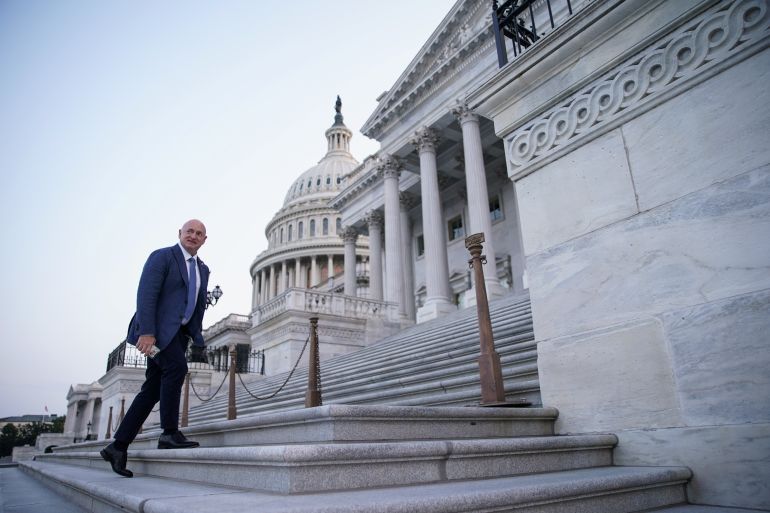A win for Biden, US Senate passes $1 trillion infrastructure bill
After years of partisan gridlock, Republicans join Democrats in support of future investment in highways, transit.

The United States Senate approved a major infrastructure spending bill designed to invest $1 trillion in roads, bridges, public transport and improved internet access across the next five years.
After years of partisan gridlock in Washington, DC, Republicans joined Democrats in supporting the legislation, delivering a legislative victory for President Joe Biden who has urged members of the two major parties in Congress to work together.
Keep reading
list of 4 itemsUS Congress votes to make ‘Juneteenth’ a federal holiday
US Congress chips away at law used to justify Soleimani strike
US Congress takes aim at China’s recruitment of scientists
Hours later, the Senate passed a $3.5 trillion budget resolution – voting 50-49 along party lines – meant to serve as bedrock of the Biden administration’s resphaing federal priorities. The budget framework aims bolster family services, health, and environment programmes.
“The American people will now see the most robust injection of funds into infrastructure in decades,” Senate Majority Leader Chuck Schumer said after the passage of the infrastructure bill.
“You’ll find better roads, bridges, airports, broadband in the United Arab Emirates than in the United States of America,” Schumer, the top Democrat in the Senate, said.
“The bill will make large and significant differences in both productivity and job creation in America for decades to come,” Schumer said.
Public opinion polls suggested the drive to upgrade America’s infrastructure, a product of months of negotiations between the White House and a bipartisan group of senators, was broadly popular.
The landmark 69-30 Senate vote set in motion a two-track legislative process that Democrats expect will allow them to enact key Democratic priorities in the sweeping $3.5 trillion budget.
Republicans, who supported infrastructure investments, have dismissed the Democrats’ budget plan – part two of the two-track process – as a “socialist” waste of money and promised to oppose it.
The US House of Representatives is prepared to take up both the $1 trillion infrastructure bill and $3.5 trillion budget measure in September, House Speaker Nancy Pelosi has said.
The budget blueprint was formally unveiled on Monday, the same day a UN climate panel warned that global warming was reaching emergency levels, or what UN Secretary-General Antonio Guterres described as a “code red for humanity”.
Senate Minority Leader Mitch McConnell, who voted for the infrastructure bill, had earlier signalled that Republicans would oppose the $3.5 trillion budget measure which he called a “radical” spending package that would create a permanent welfare state and said would usher in the largest peacetime tax increase in US history.
“Every single senator will be going on record over and over and over,” McConnell added. “We will debate, and we will vote, and we will stand up, and we will be counted, and the people of this country will know exactly which senators fought for them.”
Biden, a Democrat, hailed the Senate approval of the $1 trillion infrastructure bill and praised US senators for working across party lines on a “transformative” measure for the good of the country.
“This bill shows that we can work together,” Biden said. “I know compromise is hard for both sides. But it’s important. It’s important, it’s necessary for democracy to be able to function.”
The budget plan would provide Senate committees with spending levels for a range of federal initiatives, including helping the elderly get home healthcare and more families afford early childhood education.
It would provide tuition-free community college and foster investments in programmes to significantly reduce carbon emissions blamed for climate change.
Later, Senate committees would have to fill in the details for many federal programmes.
When Congress returns in September, it must also address increasing the US government’s authority to issue bonds to pay for US programmes.
Democrats are expected to push new national election and voting standards that would reverse recent moves by Republican-led state legislatures to restrict ballot access following former President Donald Trump’s defeat in the 2020 election.